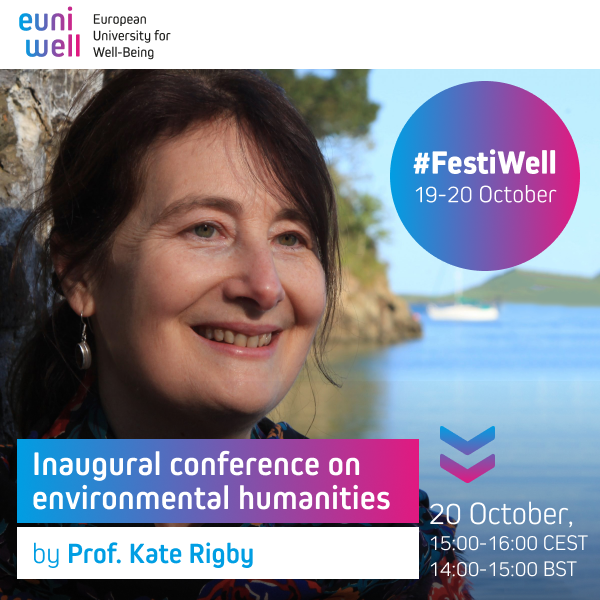Intervention de Kate Rigby - Séminaire MSH Nantes "Penser l'interdisciplinarité aujourd'hui"
-
Le 20 octobre 2021> en visioconférencefalse false
-
> Conférence en anglais
Séminaire - MSH régionale Ange-Guépin
Ce séminaire est organisé par le CRINI, Université de nantes, et par FestiWell
dans le cadre du cycle de conférences "Penser l'interdisciplinarité aujourd'hui", coordonné par la MSH Ange-Guépin.

Par sa thématique, cette conférence intitulée «Wellbeing in a more-than-human world: Perspectives from the Environmental Humanities», s’inscrit pleinement dans la thématique du séminaire "Penser l'interdisciplinarité aujourd'hui", coordonné par la MSH Ange-Guépin.
Professor Kate Rigby has a background in German studies and comparative literature, and her research lies at the intersection of environmental literary, philosophical, historical, and religious studies, with a specialist interest in European Romanticism, ecopoetics, and ecotheology. In 1999, Kate joined Australia’s cross-disciplinary National Working Group for the Ecological Humanities, and in 2004 had the honour of becoming the inaugural president of the Association for the Study of Literature, Environment and Culture (Australia-New Zealand). In 2011 she also led the creation of the Australia-Pacific Forum on Religion and Ecology. In 2002, she co-founded the eco-humanities journal Philosophy Activism Nature, and is now co-editor of the University Press of Virginia series, Under the Sign of Nature. Following on from an interdisciplinary study of cultural-historical constructions of ‘natural disaster’ viewed in the horizon of deepening climate crisis (Dancing with Disaster: Environmental Histories, Narratives, and Ethics for Perilous Times), her most recent monograph reconsiders the ecopoetic legacies of European Romanticism through a decolonial lens (Reclaiming Romanticism: Towards and Ecopoetics of Decolonization). Her current research responds to the escalating extinction crisis through an ecopoetic engagement with a neglected genre in Christian literature, a sequence of meditations on the biblical six days of creation (‘Hexameron’).
She is presently director of the Research Centre for Environmental Humanities together with the associated MA and PhD programs at Bath Spa University in the UK.
Retour en vidéo :





